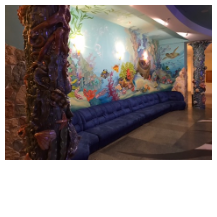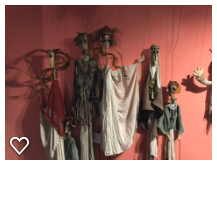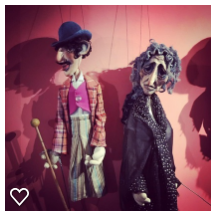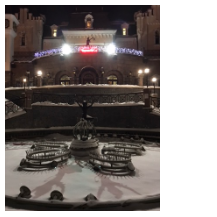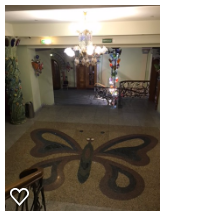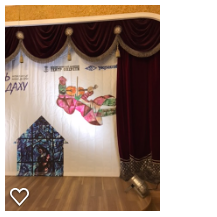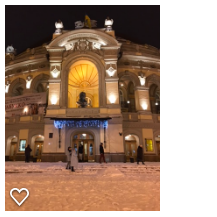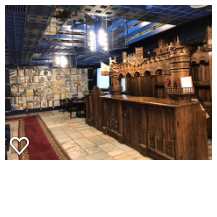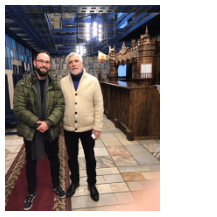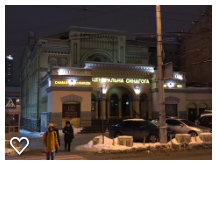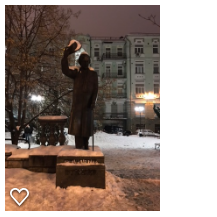Ballet and Borsch: back to my roots in Ukraine

I recently went a on a work trip to Kiev, Ukraine, performing storytelling and teaching workshops on Shakespeare at an International School for the Globe. I thought it a great place, and had some thoughts on the theatre culture I was exposed to.
With some help from the lovely drama teacher in the school I was working at, I managed to pack my last few days with trips to the theatre in Ukraine.
This was completely affordable for two reasons: a) the £ to the Hryvnia is pretty good – a coffee in town tends to work out as around 90p, but most importantly b) relative to income/other things a theatre ticket is AFFORDABLE. I bought a ticket to the national opera house (stunning building, more chandeliers than people) at 3x up from the cheapest ticket. It was 150 Hryvnia. I bought a glass of prosecco at interval for 100. A beer is about 45-50. So for 3 x the price of a beer (or the cost of a pizza across the road) I got decent seats at the opera watching top-class opera singers and ballet-dancers.
Opera and Ballet
Since you ask, it was a one-act double bill: Mozart Salieri, written by Rimsky-Korsakov, and a one-act ballet of Bizet’s Carmen. My first ever opera, my second ever ballet – after I shelled out and bought my wife tickets to English National Opera one year.
The opera didn’t move me particularly, I thought the Salieri singer (a baritone) was incredibly watchable and powerful but the best bit was when a whole bunch of singers popped out of the audience and sang Mozart’s requiem – ‘where have they been? And why not have them singing all along?’ I immediately wondered. Who knows, maybe they were on a part-time contract.
But the ballet was electric. I sat bolt upright through the whole hour to get a better look over the man in front’s bald head. It’s fair to say I didn’t know what to expect, but the design, odd costumes (somewhere between Zorro and Lego Medieval Castles) and choreography felt modern and exciting.
I spend a lot of time in theatres audience watching. I don’t know Ukrainians well enough to guess folk’s economic background (or much else besides). But I didn’t hear a single English-speaking voice throughout (apart from the helpful ushers who put me out of my Ukrainian-attempting misery by pointing and telling me where to sit and that I still had time for the toilet). There was a mix of ages, from older couples to families with young children, to groups of young women taking selfies in front of chandeliers. Some were well dressed, while others looked as though they’d just come from work.
These were not the hordes of tourists and out-of-towners I’m familiar with in West End musicals, but locals, popping to the opera, or maybe scratching that itch they’ve wanted to do for a while.
I have class preconceptions about opera. Same with the ballet. Neither were things that people saw or did where I grew up; the people who did that stuff also rode/owned horses and took skiing holidays. I always saw both as distinct from theatre, which I loved from a young age.
Which is weird, because my Granny Anne, and her sister Auntie Ray both loved ballet (my mum was a ballerina when she was little, tutu and everything) and they told me fondly about packing onto the wooden seats to watch somewhere high up when they were younger (I'm not sure where, but maybe Covent Garden). This is my same Granny who was born on Brick Lane in what is now a curry house, watched endless hours of snooker and talked with a cockney accent to the end, but I had assumed it was all to do with the preoccupation she had with appearing middle class and respectable. ‘Use a napkin, you’ll need a cake fork for that' etc.
We’re still working out the genealogy, but fairly certain her parents hailed from Odessa, also in Ukraine (a fair bit south of Kiev). And it would appear that Opera is genuinely popular here, in the literal sense of the word. So now it’s got me wondering whether actually they just inherited a culture from the old country where things like ballet and opera are for everyone - and brought it England.
Puppetry
The next day I hiked up the steps from Maidan Nezazhlostniyi (the site of various revolutions in Ukraine’s fairly tumultuous history) to the Kiev Academic Puppet Theatre. It’s quite simply one of the most beautiful buildings I’ve ever seen. It sits atop the snow covered Kreschatik park in what I can only describe as a Disney castle. My heart sank slightly as I got outside as I heard it piping out what I imagine would be described as Heartwarming and Spiritually Uplifting Music for Soviet Children of the Revolution in the 1950s and I worried about what broad, old-fashioned kind of performance I might find inside. So I was even more agog when I stepped into the incredible lobby.
Split over 3 floors, each with a different concept, someone has given a designer free reign with the instruction: create a clever, classy kids’ world of imagination. The bottom floor, guarded by the friendly babushka looking after coats, is an underwater paradise with octopus pillars, a real giant fish tank and blown glass jellyfish hanging lamps. There was a team of gnomes mining precious gems under the stairs. Giant mosaic butterflies the floor up. And then a room full of past puppets to explore. There was a group of high school kids being given a tour as I went in, and they were delighting in playing with puppets.
I didn’t know what to expect of the performance again – everything is performed in Ukrainian (which I wonder may be a political choice; it would seem everyone in Kiev is bilingual in Russian and Ukrainian). The play was a one-hour version of Don Peremplin by Lorca, about an elderly man who marries a beautiful young girl, is cuckolded by her and then teaches her to love before dying: one of those. I wiki’d it first this time so I got the gist, which meant I could just absorb the imagery and not worry about the story too much. I guess I’d developed an image of a very classic puppet show; maybe even marionettes from the rest of the building. But the production was anything but: modern, physical, and smart. 3 performers with incredible complicity, using a simple white painted set (that I think was inspired by the paintings of Klee) that highlighted the red cloak of Peremplin’s alter ego. It was right up my straße . The soundtrack was made entirely by aleatoric sounds: clicks, sighs, tuneful hums that the performers occasionally joined in with live. The puppetry if anything was less of a feature than the movement of the 2 women and 1 man, only occasionally voicing the two main characters. It was sexy and mysterious, and sad. I bloody loved it. The ticket cost me 100 Hryvnia, less than the soup and Varenyky I ate beforehand in a cheap canteen beloved of locals round the corner.
I was buzzing when I got back to hotel, partly because of the experience - partly because I’d navigated the metro and managed to order unfamiliar food in a strange language - but also because the walk back in -10 degrees and strong icy wind was the coldest I’ve ever been in the face and I was so relieved not to be doing it any more.
Musical
The next day after finishing up at the school I headed straight out to the Operetta theatre in what seemed to be a fairly up-market part of town; quite a few fancy shops, cafes and bars around – to see the Ukrainian version of Fiddler on the Roof. I shelled out a bit to get a decent seat this time, taking advantage of the exchange rate and being a decadent Westerner. 400 Hryvnia (about £11) got me row 6 – which is pretty darn good. I guess that’s quite a lot by local standards. I spent about that much on a hotel meal with cake and a drink. Still, compared to West End prices…
Maybe row 6 was a bit too close. The last time I saw Fiddler (20 years ago nearly, jeez) I was in it, for a school production. The costume design felt exactly the same. The stuck on beards were hilarious and I kept imagining that the grown (very Slavic-looking) men wearing them were actually teenage boys playing middle aged Jews. The production was a bit of a mixed bag. Parts felt strangely muted, as though the performers were playing a matinee rather than Friday night and some were plainly just not very good: every time they ended up downstage and facing the audience I could see the fear on their faces during dance sequences, all of which felt too crowded with people to really move anywhere. And there’s no denying that for a musical, Fiddler is a bit of a downer; with pogroms, estranged daughters and ethnic cleansing. But there were a couple of things that made it quite unique and struck a chord with me.
Firstly, the Brodsky synagogue is a 5 min walk away. It’s an attractive building, proudly proclaiming 120 years of existence. ‘That’s almost exactly the time most of my family arrived in the UK’, I found myself thinking ‘as a result of the pogroms described in the play I just watched’. Another couple minutes’ walk will take you to the house of Sholem Aleichem, whose stories formed the basis for the Broadway musical that would become Fiddler. There’s a statue of him in a park nearby.
At the end of the show, the group of soon-to-be-exiled Jews sing a mournful song for their lost village, Anatevka. It just occurred to me the same day that Kanev, the town I’m probably named after, (Kanefsky) is just a few miles away. As he turns to leave the stage, protagonist Tevye looks back at a tiny model of his house. Will it be there any more? It suddenly gave me a little gut twist.
‘What did my ancestors think, leaving this place? How would they feel, knowing where I am, and what I’m doing right now? Also, it’s Shabbat and I’m not in Shul, sorry.’
But I ought to mention the incredible performance of Tevye in an otherwise decent show. The main characters sang and danced well but he was a lightbulb of charisma – the audience hung on his every word – and even though I didn’t know the play well enough to follow his words, I found myself laughing with every aside because his timing and characterisation were such that I felt I knew him. I’m sometimes a bit dubious about actors in Jewface (yep that’s what I’m going with) playing Shylock and Fagin but this time it didn’t matter. I don’t know if he is Jewish or not but his whole being felt true to the role – he felt like my long-lost uncle Tevye and I wanted to hear his story. He got the longest standing ovation I’ve ever seen, my hands are still sore from clapping (and freezing Black Sea winds).
Children's Theatre
On my final day, just before flying back a helpful contact managed to arrange a meeting for me to go and see the Kiev Academic Theatre for Young People (and some other words I couldn’t translate). I couldn’t see a performance sadly, as they began at the airport check-in time but I was hugely grateful to get there. After a slightly surreal (and horribly expensive) phone call back to England where my brilliant friend Joe translated into Russian and back, I got to ask the Artistic Director – the very warm Viktor Sergeiyevitch about the health of Children’s Theatre in Kiev.
His theatre has two spaces: a 400 seater pros arch and a smaller black box studio. He has an enormous amount of plays in rep, playing every day of the week. Polyanna, (whose set I saw) has a cast of 20. He has 50 actors on the payroll. The numbers make my eyes boggle. He explains to me that both shows are sold out all weekend.
The secret? The theatre has been going 95 years, there are 3 different theatres for children in Kiev alone (including a children’s opera) and 3 separate puppet theatres. And putting on high quality shows. It would appear there is both supply and demand, a healthy culture that I’m envious of. I’d like to come back again and see the product, but I already have a gut feeling that it’s going to be very good. Oh and I looked up tickets. They’re as little as 60 Hryvnia (that’s less than a bowl of borsch).
Imagine if we had a culture that supported so many high quality productions that were so accessible for local people...



